Lochhead on Marketing
211 The Enduring Power of Positioning with Laura Ries (Part 1)
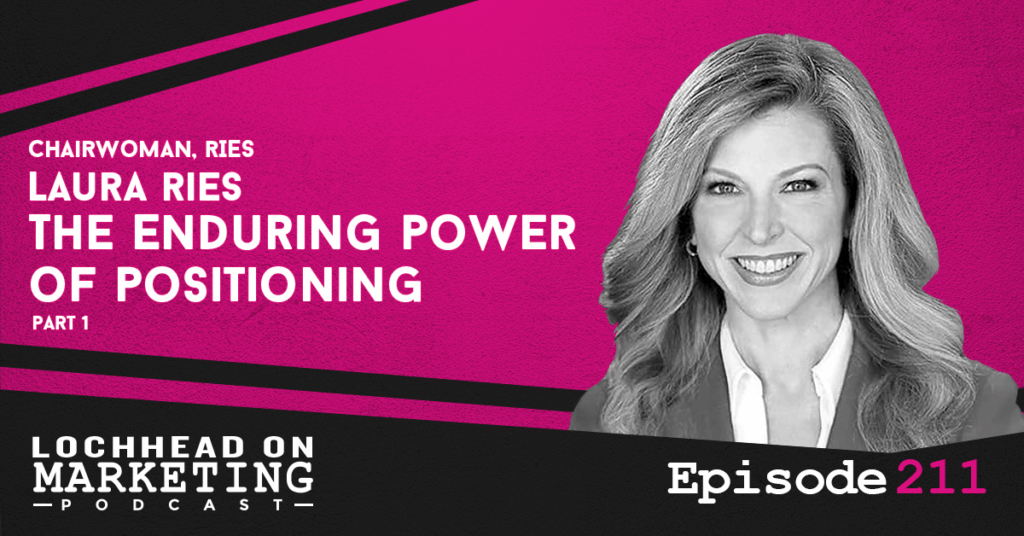
Podcast (lochheadonmarketing): Play in new window | Download (Duration: 1:02:14 — 42.7MB) | Embed
Subscribe: Apple Podcasts | Spotify | RSS | More
This week, we sat down with marketing royalty Laura Ries, the daughter of Al Ries and Chairwoman of RIES, on Follow Your Different to unpack what makes for truly powerful brand building. We thought that it was so good, it would be a shame if the folks here at Lochhead on Marketing were to miss out. So let’s get everyone caught up while we wait for part 2 to drop!
The discussion, sparked by American Eagle’s controversial Sydney Sweeney campaign, offers a masterclass in cutting through the noise and making brands that dominate for decades, not just news cycles. In a world obsessed with fleeting attention spans, viral TikToks, and celebrity partnerships, the rules for building a lasting brand have never been more confusing, or more misunderstood. When “attention” has become the trending currency, too many marketers forget the fundamental principles that separate overnight sensations from category-defining legends.
Welcome to Lochhead on Marketing. The number one charting marketing podcast for marketers, category designers, and entrepreneurs with a different mind.
Chasing Attention Versus Owning a Strategic Position
Laura Ries doesn’t mince words. Right from the start, she asks, “Are we just going out for attention’s sake?” In the American Eagle campaign, the retailer had Sydney Sweeney, a star adored by a young demographic. front and center with the tagline “Sydney Sweeney has great jeans.” The resulting hullabaloo proved attention-grabbing, but Laura and Christopher quickly zero in on the flaw: it was a win for Sweeney’s personal brand, maybe the category of jeans, but not for American Eagle.
Compare this to the iconic Brooke Shields for Calvin Klein moment, seared into pop culture by its taboo-breaking line: “Nothing comes between me and my Calvins.” Everyone still remembers it. And Shields herself, now in her 50s and 60s, gets asked about it to this day. Why did it stick when so many celebrity-driven campaigns fade fast? Laura argues the difference is clear: Calvin Klein tied a provocative moment to a real, ownable positioning idea. It wasn’t just attention; it was differentiation, and it transformed the brand.
The Leader, the Challenger, and the Power of Contrasts
Christopher then adds, “The category king of jeans is Levi Strauss”. If you’re not the leader, you can’t just market the category; you must establish a well-defined, opposite position. Calvin Klein’s campaign worked because it created a contrast in the market: there’s an implied competitor, a reason to choose Calvin’s over everything else.
American Eagle, on the other hand, failed to anchor its campaign in any clear difference or strategic enemy. Christopher asks, “If you’re American Eagle, what the fuck are you doing?” To this, they both agree: at the very least, American Eagle, given its patriotic name, should have leaned into American-made authenticity rather than a generic celebrity endorsement disconnected from any unique brand promise.
Category Design: The True Differentiator
Brands like Dude Wipes and Liquid Death exemplify the playbook for building new categories, and thus, legendary brands. Dude Wipes didn’t invent wipes, just as Liquid Death didn’t invent water. But they staked out a radically different, memorable position: “Dude” wipes for men, and canned water that resembles a beer or energy drink and brands itself as death to plastics.
This isn’t attention for attention’s sake; it’s strategic, memorable, and deeply anchored to a big idea: a core enemy, a new experience, a bold promise.
To hear more from Laura Ries and her thoughts on why virality isn’t enough to build a legendary brand, download and listen to this episode.
Bio
Laura Ries is a leading marketing strategist, best-selling author, and global keynote speaker. She is the co-author of several influential books on branding, including The 22 Immutable Laws of Branding and The Fall of Advertising & the Rise of PR written with her late father and legendary positioning pioneer, Al Ries. Her new book The Strategic Enemy: How to Build & Position a Brand Worth Fighting For will be published in September 2025 by Wiley.
As chairwoman of RIES, the consulting firm she founded with Al, Laura has advised Fortune 500 companies and startups alike on building powerful, enduring brands. Her expertise lies in positioning, brand focus, and creating category dominance in competitive markets.
Links
Connect with Laura Ries!
Website | LinkedIn | X (Formerly Twitter)
We hope you enjoyed this episode of Lochhead on Marketing™! Christopher loves hearing from his listeners. Feel free to email him, connect on Facebook, Twitter, Instagram, and subscribe on iTunes!
210 Is Agentic AI the End of SaaS as We Know It? | DisrupTV
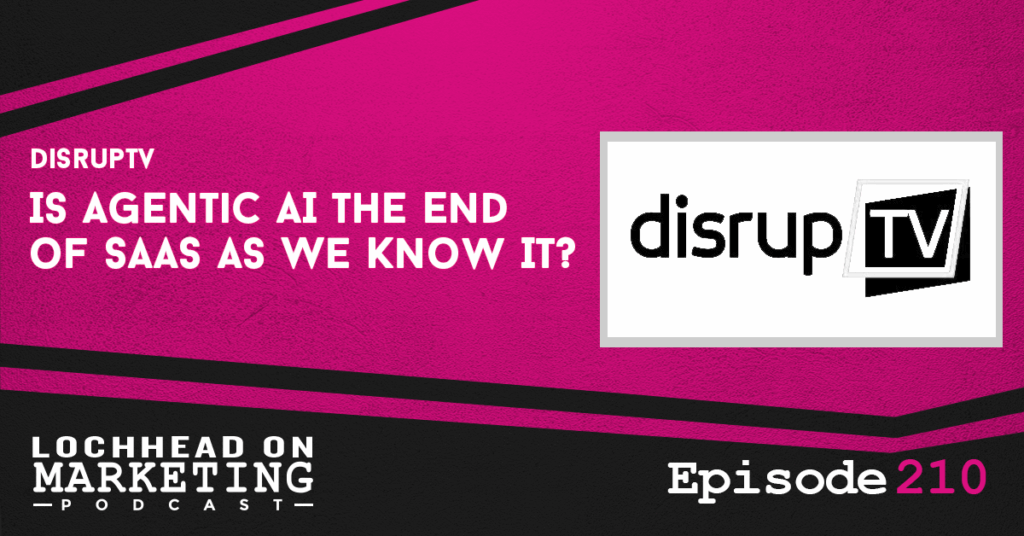
Podcast (lochheadonmarketing): Play in new window | Download (Duration: 46:05 — 31.6MB) | Embed
Subscribe: Apple Podcasts | Spotify | RSS | More
In a special episode from the DisrupTV studios, marketing visionaries Christopher Lochhead, Ray Wang, Vala Afshar, and guest Sunil Karkera dive deep into the themes of Christopher Lochhead’s latest book, The Existing Market Trap.
The conversation is a masterclass in modern marketing strategy, category design, and the seismic impact of artificial intelligence (AI) on business. If you’re a marketer, entrepreneur, or executive looking to future-proof your company and career, this episode is a must-listen.
Welcome to Lochhead on Marketing. The number one charting marketing podcast for marketers, category designers, and entrepreneurs with a different mind.
Understanding the Existing Market Trap
Most companies fail not because their products are bad, but because they compare their innovations to old market standards. This “existing market trap” forces them to compete in crowded, established categories, dooming them to incremental improvements and eventual irrelevance.
Lochhead warns that trillions in investment will be lost if companies keep chasing existing markets instead of creating new ones, and much of the 90%+ startup failure rate is due to the trap of incrementalism, trying to be “better” rather than “different.” The key is to stop benchmarking new products against legacy solutions and instead ask: What new problem are we solving, and how can we define a new category around it?
The Power of Category Design
Category design is the discipline of creating and dominating new market categories. It’s not just a marketing tactic, it’s a strategic mindset shift. Markets are groups of people with a shared problem, while categories are defined by what people believe can solve that problem. Companies like OpenAI and Nvidia didn’t chase existing demand, they created it. Legendary category designers start with a vision of a radically different future and work backward, understanding that the language used to describe a product and category shapes what people believe is possible.
Ultimately, the most powerful thing you can “ship” is a new belief about what’s possible. Rather than out-featuring competitors, the goal is to redefine the game and build the aisle, not just fight for shelf space.
AI as a Co-Founder, Not a Copilot
Treating AI as a mere “assistant” or “copilot” is a massive missed opportunity. AI should be the core foundation of your business and career. When AI is just an add-on, it leads to incremental change, but when it is treated as a co-founder, it enables exponential, net-new value creation.
The next generation will be “native AI”; they’ll expect AI to be at the center of everything. To take advantage of this, businesses should integrate AI deeply, building processes, products, and even company culture around AI from the ground up, and reimagine roles so that AI is seen as a creative partner, not just a tool.
To hear more of this amazing dialogue between marketing geniuses, download and listen to this episode.
Links
If you wish to check out more episodes from DisrupTV, you can do so on these links:
LinkedIn | X (formerly Twitter) | Youtube | Apple Podcast | Website
We hope you enjoyed this episode of Lochhead on Marketing™! Christopher loves hearing from his listeners. Feel free to email him, connect on Facebook, Twitter, Instagram, and subscribe on iTunes!
Have a Legendary 2025
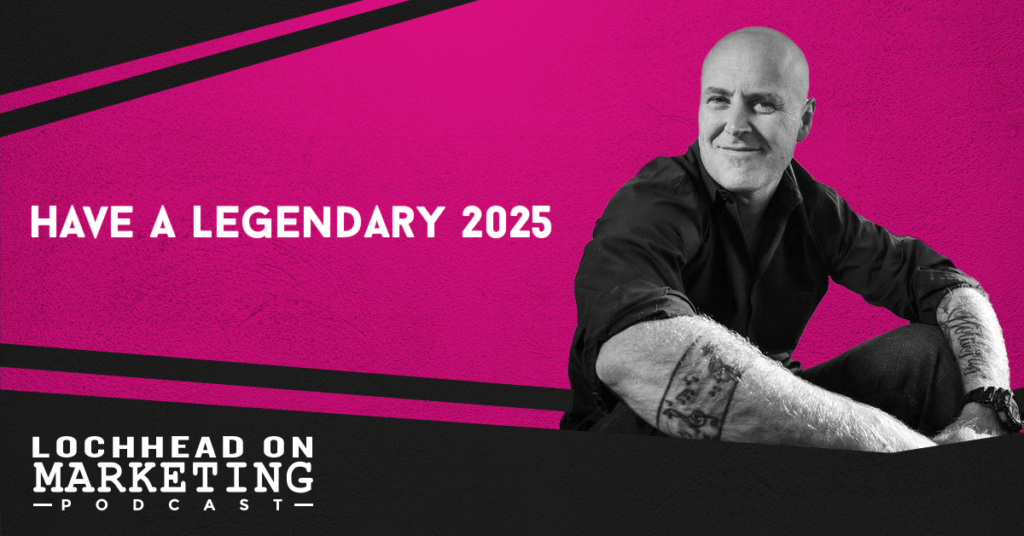
Podcast (lochheadonmarketing): Play in new window | Download (Duration: 6:59 — 4.8MB) | Embed
Subscribe: Apple Podcasts | Spotify | RSS | More
Welcome to Lochhead on Marketing 2025! In this New Year’s episode, we reflect on the past year and look forward to 2025, with a focus on significant career trends and the impact of AI on the workforce.
With 60% of Americans considering job changes, the episode highlights the diminishing value of traditional knowledge work and the rise of “creative capitalists” who leverage AI for innovation. Our 2025 focus includes helping individuals identify their unique strengths, connect them to meaningful contributions, and achieve personal and financial fulfillment.
Join us in embracing these transformative opportunities for a legendary year ahead.
Welcome to Lochhead on Marketing. The number one charting marketing podcast for marketers, category designers, and entrepreneurs with a different mind.
Trends in Job Changes
Recent surveys reveal a striking trend: approximately 60% of Americans are contemplating job or career changes in 2025. This statistic, reported by Gallup and corroborated by a résumé templates survey, indicates a widespread desire for new opportunities. Specifically, 56% of individuals are looking to pursue new jobs, with 27% actively searching. This data suggests that more than half of the workforce is seeking meaningful transitions in their careers.
The New Reality of AI
As we navigate this new landscape, we must acknowledge the rapid advancement of artificial intelligence (AI). We are no longer in a future where AI is a distant concept; it is now a present reality. The workforce will be divided into two categories: those who thrive in this new environment and those who struggle to adapt.
For the past 70 years, the highest value work has been classified as “knowledge work,” a term coined by the renowned Peter Drucker. Knowledge workers acquire valuable information and apply it to produce results. However, in an AI-driven world, the value of existing knowledge is diminishing daily. Tools like ChatGPT and Google Gemini can provide insights and strategies that were once the exclusive domain of high-end knowledge workers.
The Rise of Creative Capitalists
In this evolving landscape, the new high-value role is that of the “creative capitalist.” These individuals are not just knowledge workers; they are innovators who generate new knowledge and ideas, leveraging AI to enhance their creativity and productivity. Those who can harness AI to create unique solutions and insights will find themselves at the forefront of success in 2025 and beyond.
Conversely, those who cling to traditional knowledge work without adapting to the changes brought about by AI may face significant challenges. The tech industry has already seen substantial layoffs, with around 200,000 job losses reported in 2024. This serves as a stark reminder of the need to evolve and embrace new ways of working.
To hear more about the new trends and what you need to adapt in this new year 2025, download and listen to this episode.
We hope you enjoyed this episode of Lochhead on Marketing™! Christopher loves hearing from his listeners. Feel free to email him, connect on Facebook, Twitter, Instagram, and subscribe on iTunes!
208 Clarity in Your Category POV with Katrina Kirsch | Pirate Jam
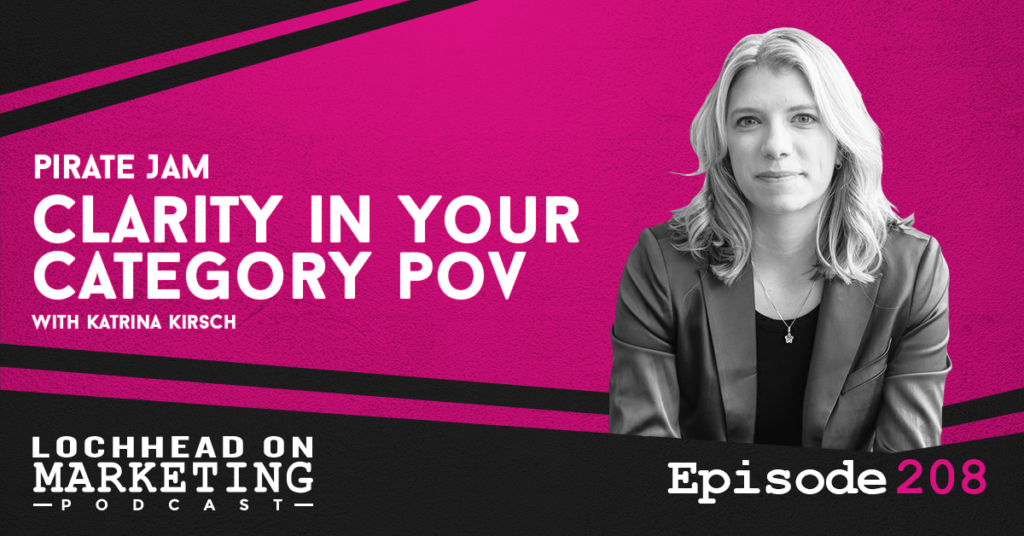
Podcast (lochheadonmarketing): Play in new window | Download (Duration: 48:34 — 33.3MB) | Embed
Subscribe: Apple Podcasts | Spotify | RSS | More
On this episode of Lochhead on Marketing, we dive deep with fellow Category Pirate Katrina Kirsch into the critical importance of clarity in marketing.
We explore the common pitfalls that entrepreneurs and marketers face when trying to articulate their points of view (POVs) and the challenges of standing out in a crowded marketplace.
This episode will break down the key insights from their discussion, and offer thorough explanations & actionable advice to help you refine your marketing strategies.
Welcome to Lochhead on Marketing. The number one charting marketing podcast for marketers, category designers, and entrepreneurs with a different mind.
Katrina Kirsch on the Challenge of Clarity in Marketing
Christopher opens the discussion by highlighting a prevalent issue: many marketing messages are convoluted and fail to convey the core message clearly. He points out that when potential customers visit a company’s website, they often leave feeling confused about what the business actually does. This confusion stems from the tendency of companies to overcomplicate their messaging, using jargon and clever phrasing that ultimately obscures their value proposition.
Katrina agrees, sharing her experiences with creatives who often fall into the trap of trying to be overly clever in their marketing. She emphasizes that while creativity is essential, it should not come at the cost of clarity. The duo stresses that the most effective marketing is straightforward and easy to understand. They argue that clarity is not just a nice-to-have; it is a fundamental requirement for successful marketing.
The Power of Simplicity
The conversation shifts to the power of simplicity in messaging. Christopher cites Walmart’s tagline, “Save money. Live better,” as an example of effective simplicity. This tagline is memorable and communicates the brand’s value proposition clearly. He contrasts this with the overly complex messaging often found in the tech industry, where companies may describe their products in multiple ways, leading to confusion rather than clarity.
Katrina shares a story about a photography club leader who was preparing to launch a virtual camp. The leader’s email communications were filled with clever but confusing language, including hidden links and overly complex descriptions. After reviewing the emails together, Katrina advised him to prioritize clarity over cleverness. She emphasizes that when communicating with an audience, especially those unfamiliar with the subject matter, it is crucial to be as clear as possible.
Katrina Kirsch on the Dangers of Overcomplication
Christopher and Katrina discuss how the desire to sound smart can lead to overcomplicated messaging. They reference a smart startup CEO who, despite his intelligence, produced a press release that described the company’s product in six different ways. This lack of consistency made it difficult for readers to understand what the company actually did. Christopher points out that this is a common mistake among intelligent individuals who may feel the need to showcase their knowledge through complex language.
Katrina adds that in certain fields, such as academia or science, complexity can be valued. However, in marketing, especially for solopreneurs and small businesses, clarity should take precedence. The speakers agree that the goal should be to communicate the problem being solved and the solution offered in the simplest terms possible.
To hear more from Katrina Kirsch on the Importance of having a clear POV, download and listen to this episode.
Bio
Katrina Kirsch is a skilled content strategist and writer specializing in creating impactful marketing strategies and engaging content.
With a background in journalism and digital marketing, Katrina has a talent for crafting clear, compelling messages that resonate with diverse audiences. She excels in SEO, social media management, and brand storytelling, helping businesses build strong online presences.
Passionate about connecting ideas with people, Katrina stays ahead of industry trends to deliver innovative solutions. Her dedication to quality and creativity has earned her a reputation as a trusted professional committed to driving meaningful results for her clients and collaborators.
Links
Follow Katrina Kirsch!
Website | LinkedIn | X (formerly Twitter)
We hope you enjoyed this episode of Lochhead on Marketing™! Christopher loves hearing from his listeners. Feel free to email him, connect on Facebook, Twitter, Instagram, and subscribe on iTunes!
207 Write Your Way to Market Leadership: Fernando Labastida on How Writing a Book Shapes New Markets
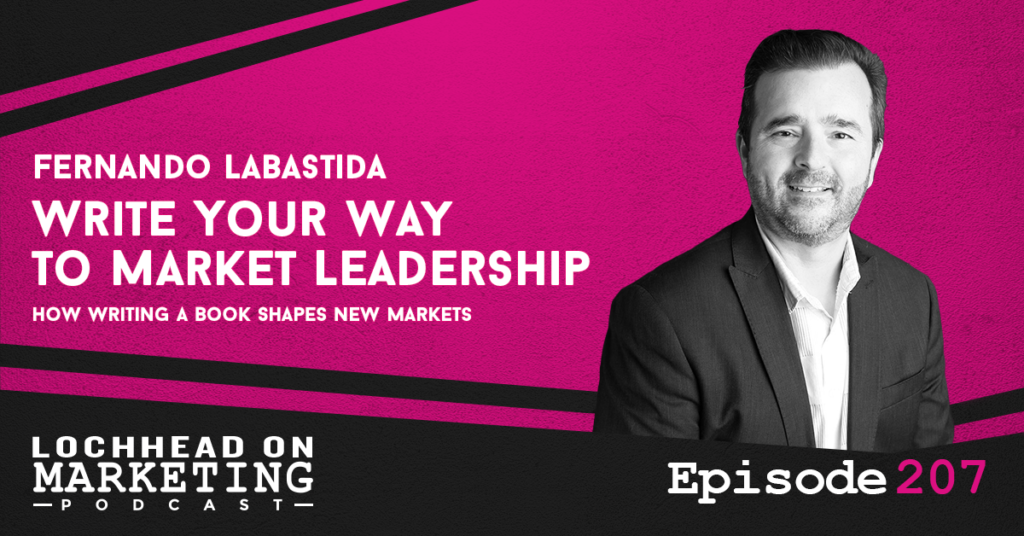
Podcast (lochheadonmarketing): Play in new window | Download (Duration: 1:05:08 — 44.7MB) | Embed
Subscribe: Apple Podcasts | Spotify | RSS | More
On this episode of Lochhead on Marketing, we engage in a thought-provoking conversation with Fernando Labastida, an innovative thinker in category design and a proponent of businesses creating their own unique markets.
The discussion centers on the transformative role of writing a book as a strategy for businesses to carve out their unique markets and establish themselves as category leaders.
Welcome to Lochhead on Marketing. The number one charting marketing podcast for marketers, category designers, and entrepreneurs with a different mind.
Fernando Labastida on the Value of Writing a Book
Fernando Labastida begins by discussing the advantages of writing a book, asserting that it can serve as a powerful means to organize and galvanize ideas. He notes that while it’s possible to design a category without writing a book, the process of writing can clarify thoughts and solidify concepts.
Fernando likens writing a book to assembling a puzzle or using a paint-by-numbers coloring book, where a detailed outline helps structure the ideas.
He also highlights how a book can kickstart marketing efforts, enabling authors to engage in “information wars” and “air wars” to evangelize their categories. A book can open doors to speaking engagements, podcast appearances, and networking opportunities, amplifying the author’s message across various platforms.
The Impact of Being an Author
Christopher shares a personal anecdote about the impact of being a published author. He recounts a recent experience in Fiji, where a stranger recognized him as one of the authors of “Play Bigger” and expressed how the book had changed his life and business. This moment underscores the profound effect that a book can have on readers, creating a lasting connection that is often more impactful than other forms of media, such as podcasts or blogs.
Fernando posits that in an age where attention spans are dwindling, writing a book demonstrates a commitment to deep thinking and sustained effort, which can resonate with audiences.
Creating New Language and Thought Leadership
The conversation shifts to the importance of language in establishing thought leadership. Christopher points out that those who create new language often dominate their categories. He cites Starbucks as an example, where the company’s unique terminology has shaped customer expectations and industry standards.
Similarly, he discusses how ChatGPT has redefined language around artificial intelligence, introducing terms like “large language model” and “prompt engineer,” which have become integral to the conversation about AI.
Fernando echoes this sentiment, referencing the Eisenberg brothers, who coined terms like “conversion rate optimization” to describe emerging concepts in digital marketing. He emphasizes that new problems arising from technological advancements necessitate new solutions and, consequently, new language to describe them.
To hear more from Fernando Labastida and the legendary value of writing a book, download and listen to this episode.
Bio
Fernando Labastida is a seasoned marketing strategist known for his expertise in content marketing and business growth. He has helped tech companies and startups build brand authority through strategic storytelling, connecting businesses with their target audiences.
Passionate about innovative growth, Fernando excels in crafting compelling narratives that drive engagement and customer loyalty, making him a trusted leader in tech marketing who skillfully blends strategy with creativity to achieve impactful results.
Links
Follow Fernando Labastida!
We hope you enjoyed this episode of Lochhead on Marketing™! Christopher loves hearing from his listeners. Feel free to email him, connect on Facebook, Twitter, Instagram, and subscribe on iTunes!
206 The One-Sentence Strategy | Pirate Jam
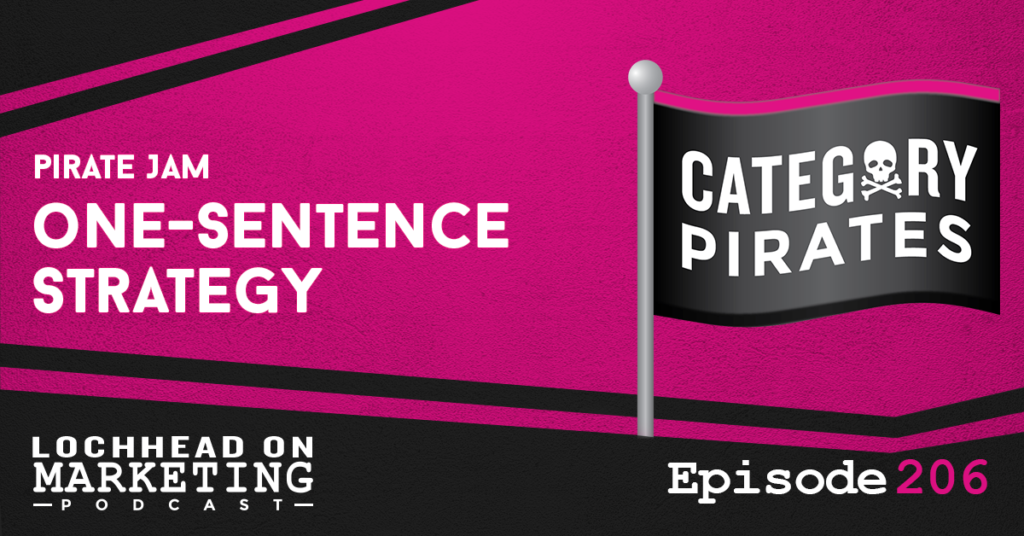
Podcast (lochheadonmarketing): Play in new window | Download (Duration: 10:15 — 7.0MB) | Embed
Subscribe: Apple Podcasts | Spotify | RSS | More
On this episode of Lochhead on Marketing, Category Pirates Christopher Lochhead and Eddie Yoon talk about the power of simplifying business strategies into a One-Sentence Strategy.
They discuss how successful companies, from large enterprises to solopreneurs, leverage concise strategies to drive focus and alignment. Highlighting examples like Gillette’s “revenue per user per year” and Microsoft’s “a computer on every desktop,” they emphasize the importance of clarity and customer-centric approaches.
The episode underscores that while crafting a one-sentence strategy is challenging, it is essential for achieving cohesive company culture and long-term success.
Welcome to Lochhead on Marketing. The number one charting marketing podcast for marketers, category designers, and entrepreneurs with a different mind.
The Power of Having One Clear Strategy
Eddie Yoon emphasizes that the most successful businesses, regardless of their size, often operate under a singular, clear metric or strategy. This simplicity allows for better focus and alignment across the organization. He cites the example of Gillette, which used “revenue per user per year” (RUPI) and “profit per user per year” (PUPI) as their guiding metrics. This approach not only streamlined their decision-making but also ensured that all team members understood their primary objectives.
Christopher & Eddie then give examples of several legendary companies that have thrived due to their clear, concise strategies. For instance, Microsoft’s one-sentence strategy was “a computer on every desktop,” which guided their product development and marketing efforts for decades. Similarly, YETI, known for its premium ice coolers, positioned itself with the straightforward strategy of offering a “premium ice cooler,” differentiating itself from traditional, lower-cost options.
The Importance of Customer Focus
They also point out how these companies maintain a customer-centric approach. For example, the Keurig coffee system was built around the idea of convenience and choice, with the metric of “K-cups per brewer per day” driving their business decisions. This focus on customer experience and satisfaction is crucial for long-term success.
Christopher explains that while these strategies are simple to understand, executing them effectively is often challenging. He notes that when a company has a clear strategy, it becomes easier to align employees, investors, and customers towards a common goal. This alignment is essential for fostering a cohesive company culture and driving growth.
The Challenge of Crafting a One-Sentence Strategy
Creating a one-sentence strategy is not a straightforward task. It requires deep reflection and a thorough understanding of the business’s core mission and values.
Christopher & Eddie discuss how many organizations settle for vague or overly complex strategies, which can lead to confusion and misalignment. They advocate for a rigorous process of distillation, where businesses must sift through their ideas and focus on what truly matters.
One of the standout examples is the Ritz-Carlton’s guiding principle: “Ladies and gentlemen serving ladies and gentlemen.” This simple yet profound statement encapsulates their commitment to exceptional service and sets a high standard for their employees. It illustrates how a well-crafted strategy can inspire and elevate a brand’s identity.
To hear more From Christopher & Eddie about the One-Sentence Strategy, download and listen to this episode.
Want to hear more Pirate Jams? Head on over to Category Pirates and enjoy more conversations between Category Pirates Christopher & Eddie!
Don’t forget to grab a copy (or gift!) of one of our best-selling books:
Snow Leopard: How Legendary Writers Create A Category Of One
The Category Design Toolkit: Beyond Marketing: 15 Frameworks For Creating & Dominating Your Niche
A Marketer’s Guide To Category Design: How To Escape The “Better” Trap, Dam The Demand, And Launch A Lightning Strike Strategy
 The 22 Laws of Category Design: Name & Claim Your Niche, Share Your POV, And Move The World From Where It Is To Somewhere Different
The 22 Laws of Category Design: Name & Claim Your Niche, Share Your POV, And Move The World From Where It Is To Somewhere Different**NEW!** The B2B Tech Marketer’s Guide To Category Design: How To Engineer Your Market, Find What Makes You Different, And Become A Category Queen
We hope you enjoyed this episode of Lochhead on Marketing™! Christopher loves hearing from his listeners. Feel free to email him, connect on Facebook, X (formerly Twitter), Instagram, and subscribe on iTunes and Spotify!
205 The Category Makes the Brand: Unpacking Brand Hierarchy in Category Design | Pirates Perspective
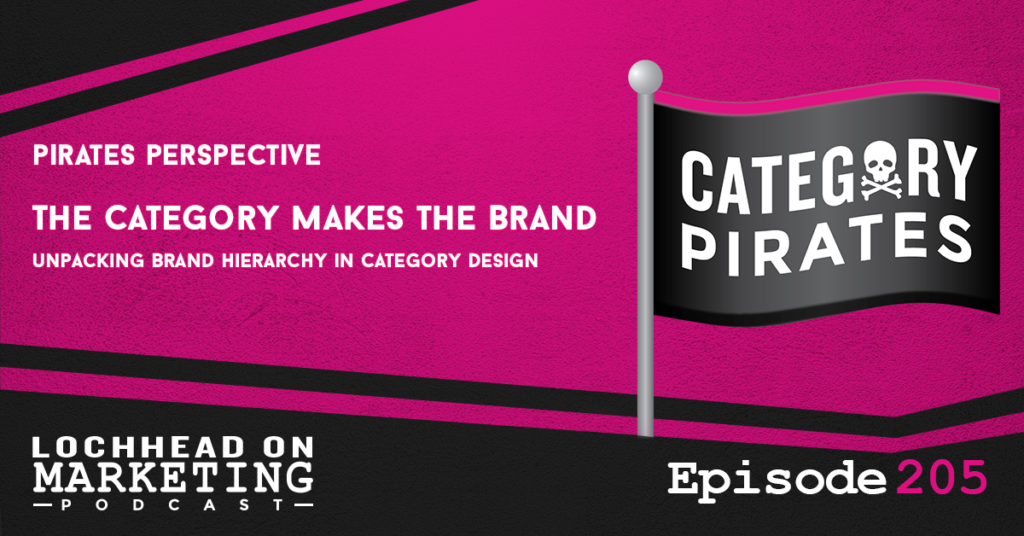
Podcast (lochheadonmarketing): Play in new window | Download (Duration: 32:27 — 22.3MB) | Embed
Subscribe: Apple Podcasts | Spotify | RSS | More
On this episode of Lochhead on Marketing, Christopher Lochhead, a three-time CMO and a leading figure in category design, gives his Pirates Perspective into the critical concept that “the category makes the brand, not the other way around.”
This principle underscores the importance of understanding and defining a category in marketing, as it can profoundly influence consumer perception and the overall success of a brand. Through engaging stories and practical examples, Christopher illustrates how effective category design can lead to market dominance. Additionally, Christopher highlights Microsoft’s strategic shift in the tech industry, emphasizing the importance of a unified category approach.
Welcome to Lochhead on Marketing. The number one charting marketing podcast for marketers, category designers, and entrepreneurs with a different mind.
Understanding Category Design
Category design is a strategic approach that involves creating and defining a new market category, thereby positioning a brand as the leader within that category. This concept is pivotal because it shifts the focus from competing within an existing market to creating a new space where the brand can dominate.
Christopher emphasizes that successful brands are those that not only understand their category but also actively shape it.
The Category Shapes the Brand
Christopher’s central thesis is that the category makes the brand, not the other way around. This means that the success of a brand is largely determined by how well it defines and owns its category. By focusing on the problems they solve and the experiences they create, companies can differentiate themselves and achieve lasting success in their respective markets.
Case Studies: Barcade and Qualtrics
Christopher then shares compelling examples to illustrate the importance of category design. One notable example is Barcade, an innovative arcade bar that successfully carved out its niche by blending the nostalgia of classic arcade games with a vibrant bar atmosphere. By defining its category clearly, Barcade attracted a dedicated customer base and differentiated itself from traditional bars and arcades.
Another significant case study is Qualtrics, a company that transformed its market position through a focus on experience management. Christopher contrasts Qualtrics with its competitors, such as Medallia and SurveyMonkey, to highlight the impact of effective category design. While Qualtrics successfully defined and owned its category, the other companies struggled to differentiate themselves, leading to varying degrees of success in the marketplace.
Microsoft’s Journey
Christopher recounts the story of Microsoft and its journey to dominate the office productivity software market. Initially, Microsoft faced fierce competition from established players like WordPerfect in word processing, Lotus in spreadsheets, and dBase in databases. Despite launching competitive products, Microsoft struggled to gain significant market share.
The turning point came when Mike Maples Sr., a key figure at Microsoft, discovered an anomaly in sales data during a trip to Australia. He learned that bundling applications together and offering them at a discounted price led to a significant uptick in sales. This insight prompted Maples to rethink the problem: instead of viewing these applications as separate categories, he recognized that they collectively addressed a larger issue—productivity for office workers.
To hear more about Christopher Lochhead’s Pirate Perspective on Brand and Category Design, download and listen to this episode. You can also check out more Pirates Perspective at Category Pirates.
Don’t forget to grab a copy (or gift!) of one of our best-selling books:
Snow Leopard: How Legendary Writers Create A Category Of One
The Category Design Toolkit: Beyond Marketing: 15 Frameworks For Creating & Dominating Your Niche
A Marketer’s Guide To Category Design: How To Escape The “Better” Trap, Dam The Demand, And Launch A Lightning Strike Strategy
 The 22 Laws of Category Design: Name & Claim Your Niche, Share Your POV, And Move The World From Where It Is To Somewhere Different
The 22 Laws of Category Design: Name & Claim Your Niche, Share Your POV, And Move The World From Where It Is To Somewhere Different**NEW!** The B2B Tech Marketer’s Guide To Category Design: How To Engineer Your Market, Find What Makes You Different, And Become A Category Queen
We hope you enjoyed this episode of Lochhead on Marketing™! Christopher loves hearing from his listeners. Feel free to email him, connect on Facebook, X (formerly Twitter), Instagram, and subscribe on iTunes and Spotify!
204 Apple’s Strategic Mastery: Unpacking the Category of Personal Intelligence | Pirates Perspective
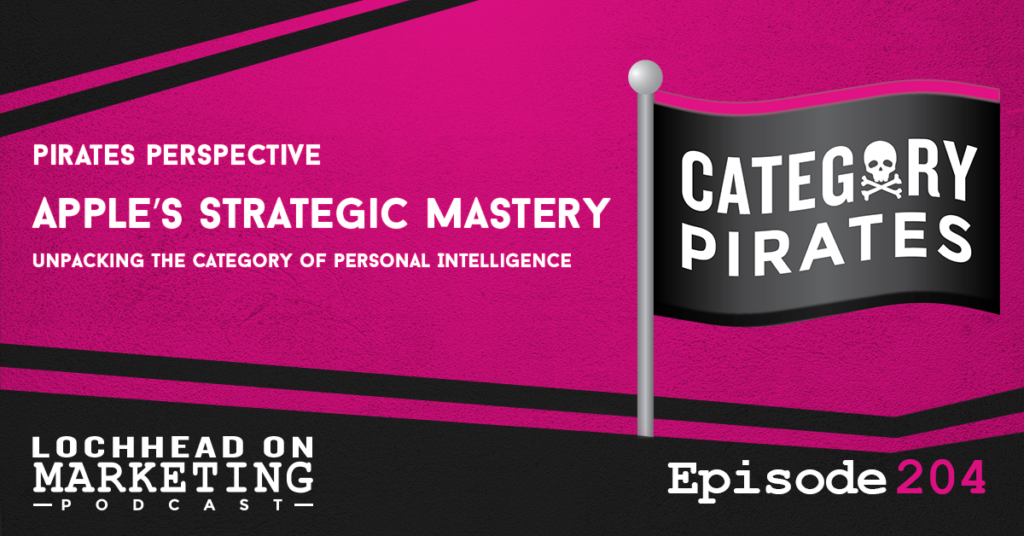
Podcast (lochheadonmarketing): Play in new window | Download (Duration: 27:03 — 18.6MB) | Embed
Subscribe: Apple Podcasts | Spotify | RSS | More
On this episode of Lochhead on Marketing, Christopher Lochhead and Eddie Yoon dissects Apple’s latest announcements from the 2024 Worldwide Developers Conference (WWDC) on an all-new Pirates Perspective.
The conversation centers around Apple’s introduction of Apple Intelligence, a cutting-edge AI-driven personal intelligence system, and their strategic partnership with OpenAI. They break down the key insights from their discussion, offering actionable advice and thorough explanations for marketers and tech enthusiasts alike.
Welcome to Lochhead on Marketing. The number one charting marketing podcast for marketers, category designers, and entrepreneurs with a different mind.
Apple Intelligence: A New Category in AI
Apple’s announcement of Apple Intelligence marks a significant milestone in the tech industry. This AI-driven personal intelligence system is designed to enhance user experiences by integrating smarter, more intuitive tools into daily lives. Christopher Lochhead praises this move, emphasizing Apple’s role as a primary category designer, particularly in the realm of personal computers.
Actionable Insights:
- Embrace Category Design: Companies should focus on creating new categories rather than just competing within existing ones. This approach can lead to market leadership and long-term success.
- Integrate AI Thoughtfully: Embedding AI in products should be done in an evolutionary manner, ensuring that it enhances user experiences without overwhelming them.
Strategic Partnership with OpenAI
Apple’s decision to partner with OpenAI rather than compete with them is a strategic move that highlights the importance of collaboration in the tech industry. Christopher Lochhead commends this approach, noting that it allows Apple to focus on serving their customers through thoughtful and aggressive innovation.
Actionable Insights:
- Leverage Partnerships: Collaborating with other industry leaders can lead to innovative solutions and a better customer experience.
- Focus on Customer Needs: Innovation should always be driven by the goal of serving customers better, rather than just outpacing competitors.
Privacy, Data Usage Concerns, and Regulations in AI
Eddie Yoon expresses both excitement and concern about the potential benefits and privacy implications of Apple’s personal intelligence system. He highlights the need for careful consideration of data usage and consumer privacy.
The conversation also delves into the need for oversight and regulations in the AI space. Christopher emphasizes the importance of strong controls while acknowledging Apple’s historical business practices and the need for critical examination.
To hear more Pirates Perspective, download and listen to this episode. You can also check out more Pirates Perspective at Category Pirates.
Don’t forget to grab a copy (or gift!) of one of our best-selling books:
Snow Leopard: How Legendary Writers Create A Category Of One
The Category Design Toolkit: Beyond Marketing: 15 Frameworks For Creating & Dominating Your Niche
A Marketer’s Guide To Category Design: How To Escape The “Better” Trap, Dam The Demand, And Launch A Lightning Strike Strategy
 The 22 Laws of Category Design: Name & Claim Your Niche, Share Your POV, And Move The World From Where It Is To Somewhere Different
The 22 Laws of Category Design: Name & Claim Your Niche, Share Your POV, And Move The World From Where It Is To Somewhere Different**NEW!** The B2B Tech Marketer’s Guide To Category Design: How To Engineer Your Market, Find What Makes You Different, And Become A Category Queen
We hope you enjoyed this episode of Lochhead on Marketing™! Christopher loves hearing from his listeners. Feel free to email him, connect on Facebook, Twitter, Instagram, and subscribe on iTunes!
203 A Tribute to Bill Walton
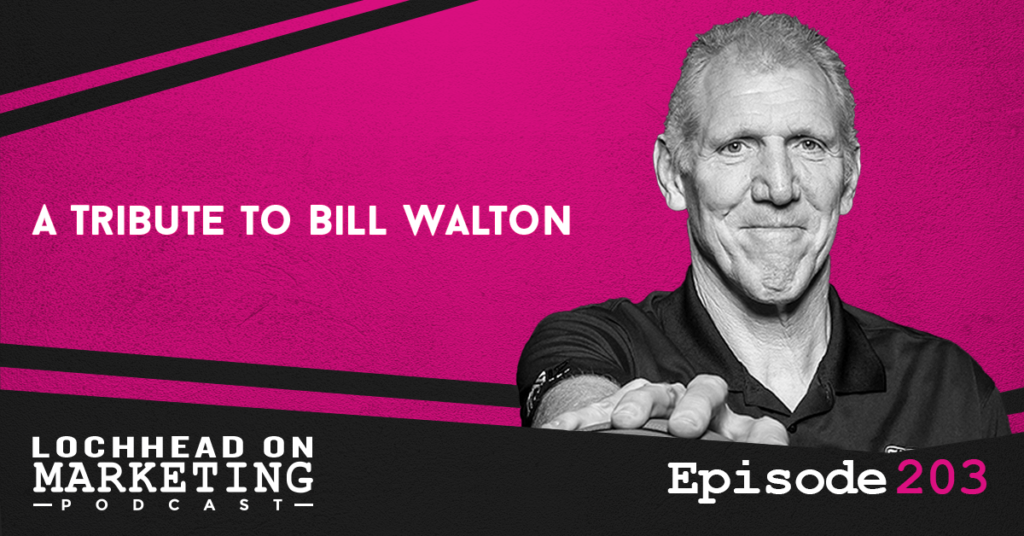
Podcast (lochheadonmarketing): Play in new window | Download (78.2MB) | Embed
Subscribe: Apple Podcasts | Spotify | RSS | More
On this episode of Lochhead on Marketing, I would like to share with you a very special tribute to a man who’s not only a legend in the world of basketball but also a cherished friend of mine—Bill Walton.
Join me as we take a walk down memory lane, revisiting the first time Bill graced my podcast with his presence and the indelible mark he’s left on my life.
A Meeting of Minds in San Diego
It was August 24th, 2017—a day etched in my memory, thanks to the friends who captured the moment and shared a photo of our first encounter. Meeting Bill Walton was like stepping into a storybook where the characters leap off the page. Here was one of the greatest NBA players of all time, a man whose stature was matched only by his extraordinary personality, ready to become a part of my world.
Our initial meeting took place at an executive event in sunny San Diego, where we were both slated to speak. I remember watching Bill, completely unscripted, captivating the audience with his life’s slideshow in the background. His ability to weave tales and engage listeners with nothing but his memories and a carousel of personal photos was nothing short of mesmerizing.

The Teacher in My Life
Bill’s journey is one of resilience. From battling a stutter to enduring chronic injuries, his path was never easy. Yet, he emerged stronger, channeling his love for music and life into everything he did. His passion was infectious, and his dedication to being unapologetically unique was something that deeply resonated with me.
Bill played a crucial role in my transition to becoming a teacher. His influence was a guiding light, helping me navigate through new territories with confidence. His life lessons extended beyond the court, and I was fortunate to be one of the many who benefited from his wisdom.

Radical Generosity and Unwavering Support
One of the most touching aspects of my friendship with Bill was experiencing his radical generosity firsthand. I’ll never forget the care package of memorabilia he sent my way—a testament to his thoughtful nature and the value he placed on our bond.
In the aftermath of a personal tragedy, it was Bill’s kindness that shone through the darkness. His heartfelt messages provided comfort and support when I needed it most, further solidifying the profound impact of our friendship.
As I reflect on the time spent with Bill Walton, I’m filled with immense gratitude. His legacy extends far beyond his basketball accolades; it’s etched in the hearts of those he’s touched with his generosity, spirit, and unwavering friendship.
I hope that this episode gives you a glimpse into the remarkable man that is Bill Walton and the special place he holds in my life. His story is one of triumph, tenacity, and the power of genuine connections. Thank you for joining me in this celebration of friendship and legacy.
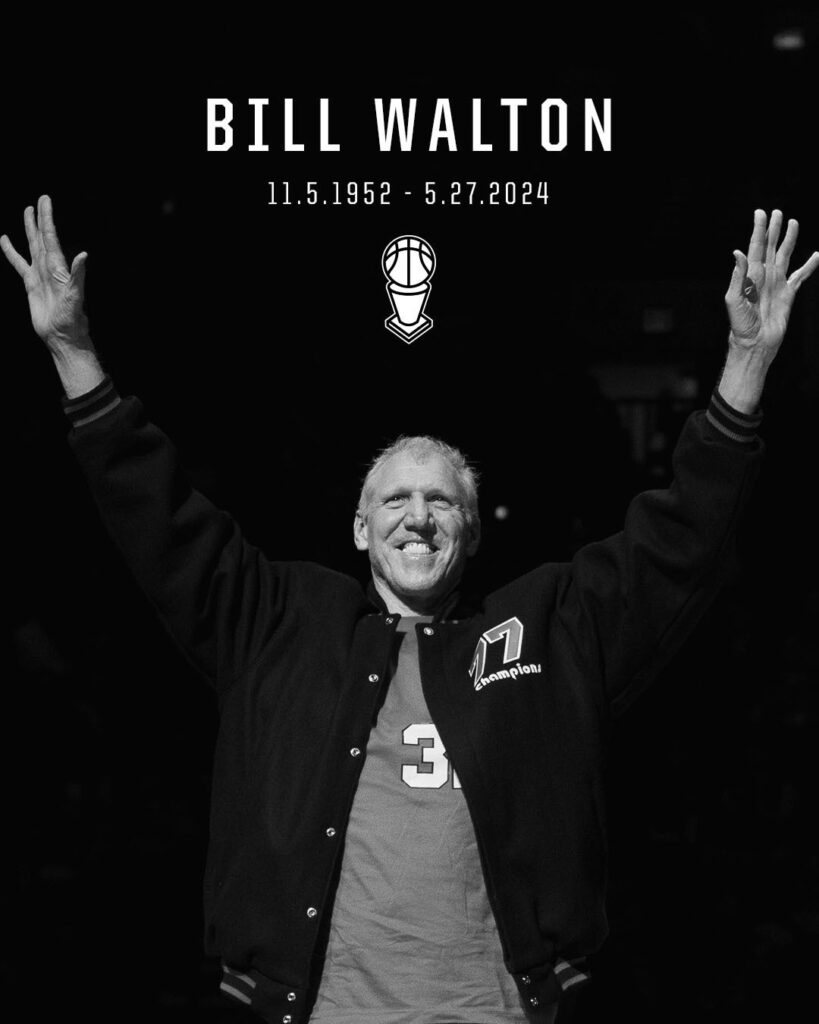
Bio
Bill Walton, an NBA legend, is renowned for his exceptional skills, dynamic personality, and influential career. Born on November 5, 1952, Walton’s basketball journey began at UCLA, where he led the Bruins to two national championships.
In the NBA, he played for the Portland Trailblazers, San Diego/Los Angeles Clippers, and Boston Celtics, earning two NBA championships and an MVP award in 1978. In 1997, Bill Walton was selected as one of the NBA’s Fifty Greatest Players of all Time.
Post-retirement, he became a beloved broadcaster, known for his colorful commentary. Walton’s legacy continues to inspire basketball enthusiasts worldwide.
Links
BillWalton.com | NBA Profile | ESPN Biography
We hope you enjoyed this episode of Lochhead on Marketing™! Christopher loves hearing from his listeners. Feel free to email him, connect on Facebook, Twitter, Instagram, and subscribe on iTunes!

